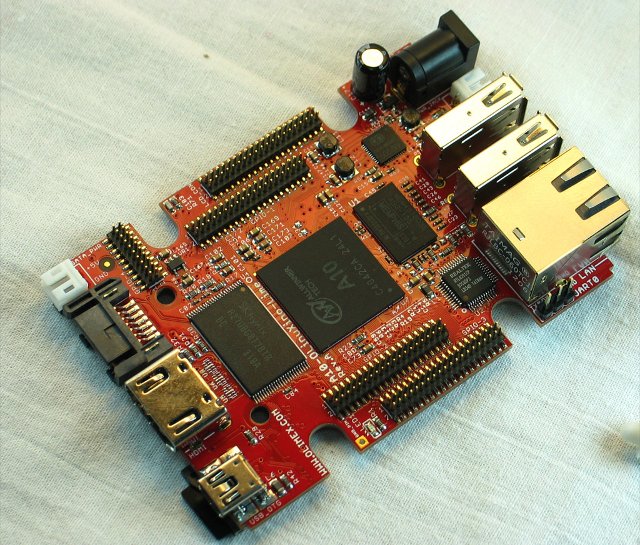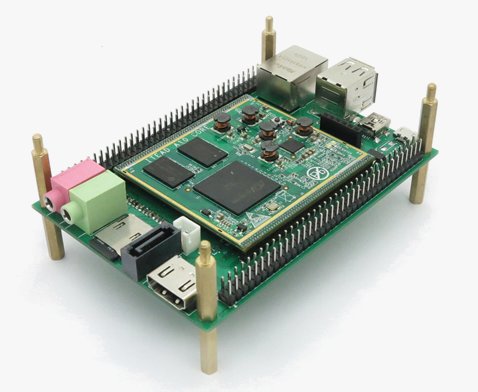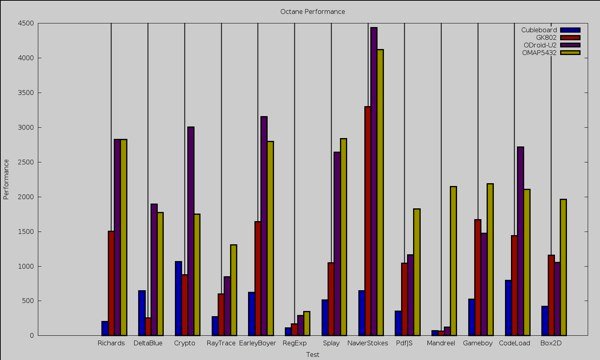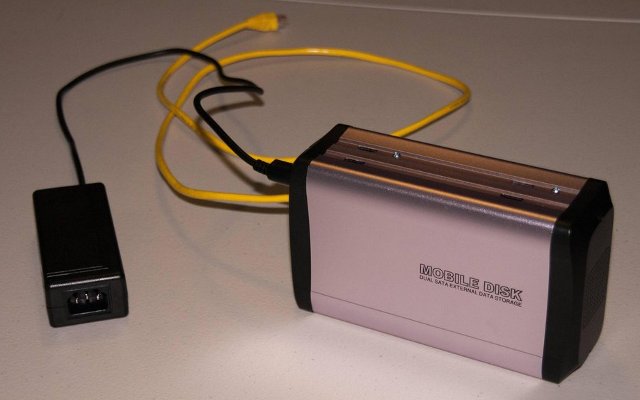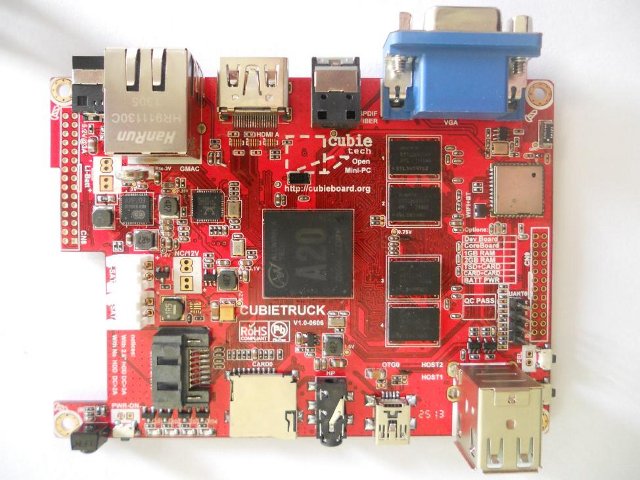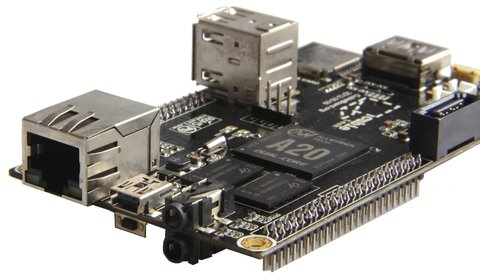Oliver Schinagl, a member of linux-sunxi community working on open source kernel and bootloader for AllWinner SoCs, has given a presentation of the community at FOSDEM 2014 to give an overview, and show what progress has been made to date. I’ll write a summary in this post, but if you want to watch the video and/or access the slides scroll down at the bottom of the post. After explaining what sunxi is, and introducing himself, he gave some information about AllWinner and their SoCs: Founded in 2007 in Zhuhai, Chiang now with 550 employees including 450+ engineers 15% market share in 2013 for tablet SoCs, only behind Apple. Products: F-series SoC (2010), A10 (2011), A13, A10s (2012), and A20 (2013). (cnsoft He skipped A31(s) and A80 here as they are not really supported by the community). They list “Open Source Source” and “GPLv3” in their marketing materials although they clearly […]
Olimex Announces 30 Euros A10-OLinuXino-LIME Development Board for December
The Raspberry Pi, Beaglebone Black and Cubieboard are probably the best selling ARM Linux boards in the sub $50 category, but they’ll soon be joined by Olimex A10-OLinuXino-LIME powered by AllWinner A10 ARM Cortex A8 SoC with 512MB RAM that will sell for 30 Euros (About $40) when it becomes available in December. Another version of the board based on AllWinner A20 dual core Cortex A7 SoC, called A20-OLinuXino-LIME will also be sold, adding Gigabit Ethernet, and scheduled for Q1 2014. Pricing has yet to be disclosed for the A20 version. A10-OLinuXino-LIME specifications: SoC – AllWinner A10 ARM Cortex-A8 @ 1GHz with Mali-400 GPU System Memory – 512MB DDR3 Storage – microSD card slot, SATA, and optional 4GB NAND Flash Video Output – HDMI 1080p USB – USB-OTG + 2x USB Hosts Connectivity – 10/100Mbit Ethernet Expansions – 200 GPIOs on 0.05″ connectors Misc – Lipo battery management and connector, […]
$59 Iteaduino Plus ARM Linux Board Features Raspberry Pi and Arduino Compatible Headers
Iteaduino Plus is a development platform designed by ITEAD studio, a Shenzhen based company, powered by AllWinner A10 with 1GB RAM, a micro SD card slot, expansion header, etc… Overall features are very similar to the Cubieboard, but the platform is comprised of a baseboard and a CPU module. The baseboard features a 26-pin GPIO header compatible with the one on the Raspberry Pi, and you can add an expansion board to connect Arduino Shields. Iteaduino Plus specifications: SoC – AllWinner A10 Cortex A8 @ 1GHz with Mali400 GPU System Memory – 1GB DDR3 @480MHz Storage – 1x micro SD slot, 1x SATA Video Output – HDMI Connectivity – 10/100M Ethernet USB – 2x USB Host, 1x USB OTG Audio – 3.5mm Audio in and out jacks Expansion headers (see pin assignment) 2x 2×36-pin (Total 144, but not all used) – I2C, SPI, RGB/LVDS, CSI/TS, FM-IN, ADC, CVBS, VGA, SPDIF-OUT, […]
Texas Instruments OMAP5432 EVM Benchmarked Against ODROID-U2, BeagleBone Black, GK802… and an Intel Core i7-2600K based PC
Texas instruments and SVTronics announced an OMAP5 evaluation board a couple of months ago. The board features OMAP5432 dual Cortex A15, dual Cortex M4 SoC, 2GB RAM, a 4GB eMMC module, USB 3.0, SATA and more. SVTronics sent a board to Linux.com, where they wrote a short review, followed by an article benchmarking the OMAP5 EVM against AllWinner A10, Freescale i.MX6, Exynos 4412 Prime, and TI Sitara platforms, namely Cubieboard, GK802, ODROID-U2, and BeagleBone Black, all running Linux. Ben Martin, the writer, also benchmarked the board against a Linux PC powered by an Intel Core i7-2600K processor (4 cores, 8 thread, clocked at 3.4GHz, with a turbo frequency up to 3.8GHz). The board used was an early version, clocked at 800MHz, and later in September, all boards will be clocked at 1.5Ghz, so for benchmarks that stress the CPU, you could expect almost double the performance. With that in mind, […]
Fedora 19 ARM Remix R1 Release With Support for AllWinner A10, A10s, A13 and A20 SoCs
After releasing a stable version of Fedora 18 for AllWinner A10 and A13 in February, Hans de Goede, working at Red Hat and a Fedora contributor, has recently announced “Fedora 19 ARM remix for Allwinner SOCs” on linux-sunxi community mailing list. This released based on Fedora 19 for ARM together with linux-sunxi kernel and u-boot, adds support for A10s and A20 based devices, and 38 boards and devices are now supported. To give it a try, download the 665MB image:
|
1 |
wget http://scotland.proximity.on.ca/contrib-images/hansg/Fedora-19-a10-armhfp-r1.img.xz |
then write it to an SD card (8GB or greater):
|
1 2 |
xzcat Fedora-19-a10-armhfp-r1.img.xz > /dev/[device] sync |
Where you have to replace [device] with your actual SD card device, e.g. sdc.Since u-boot is board/product specific, you’ll also have to update u-boot for your hardware. Remove the SD card, re-insert it, and run:<
|
1 |
sh <uboot-part-mount>/select-board.sh |
to display a graphical menu (if dialog is installed on your Linux PC), or a list supported boards and products:
|
1 2 3 4 5 6 7 8 9 10 11 12 13 14 15 16 17 18 19 20 21 22 23 24 25 26 27 28 29 30 31 32 33 34 35 36 37 38 39 |
Available boards: a10_mid_1gb A10 tablet sold under various names (whitelabel) a13_mid A13 tablet sold under various names (whitelabel) a10s-olinuxino-m A10s-OLinuXino-MICRO (Olimex) a13-olinuxino A13-OLinuXino (Olimex) a13-olinuxinom A13-OLinuXino-MICRO (Olimex) a20-olinuxino_micro A20-OLinuXino-MICRO (Olimex) auxtek-t003 Auxtek T003 hdmi tv stick auxtek-t004 Auxtek T004 hdmi tv stick ba10_tv_box BA10 TV Box coby_mid7042 Coby MID7042 tablet coby_mid8042 Coby MID8042 tablet coby_mid9742 Coby MID9742 tablet cubieboard_512 Cubieboard development board 512 MB RAM cubieboard Cubieboard development board 1024 MB RAM cubieboard2 Cubieboard 2 (A20) development board dns_m82 DNS AirTab M82 tablet EOMA68-A10 EOMA68 A10 CPU card gooseberry_a721 Gooseberry development board h6 H6 netbook hackberry Hackberry development board hyundai_a7hd Hyundai a7hd tablet inet97f-ii iNet-97F Rev.2 (and clones) tablet mele_a1000 Mele a1000/a2000 512 MB RAM mele_a1000g Mele a1000g/a2000g 1024 MB RAM mele_a3700 Mele a3700 (a1000g without sata) mini-x Mini-X 512 MB RAM mini-x-1gb Mini-X 1024 MB RAM mk802 mk802 (with female mini hdmi) 512 MB RAM mk802-1gb mk802 (with female mini hdmi) 1024 MB RAM mk802_a10s mk802 with A10s (s with a circle around it on the barcode label mk802ii mk802ii (with male normal hdmi) 1024 MB RAM pcduino pcDuino development board pov_protab2_ips9 Point of View ProTab 2 IPS 9" tablet pov_protab2_ips_3g Point of View ProTab 2 IPS tablet with 3g r7-tv-dongle r7 hdmi tv stick uhost_u1a UHost U1A hdmi tv stick wobo-i5 Wobo i5 TV Box xzpad700 XZPAD700 7" tablet |
Select […]
DIY NAS Enclosure for The Cubieboard
The Cubieboard with a 1GHz processor, 1GB RAM, a SATA port and its low price ($49) is probably one the best available options if you want to make your own ARM based NAS. The hardware is easy to get, most of the software components (Linux, SAMBA/NFS server, Bittorrent client, etc…) are available, but there are no NAS enclosure available for the Cubieboard, so this part may be a little tricky. Cubieforums user Vustus has a pretty neat and cost- effective solution for an enclosure based on off-the-shelf parts. If you want to try it yourself, you’ll need the following parts: 3.5″ USB 2.0 aluminum external dual SATA HDD enclosure ($15) – http://www.geeks.com/details.asp?InvtId=ET-3541S 10″ Flat SATA cable ($2.49) – http://www.newegg.com/Product/Product.aspx?Item=N82E16812119365 SATA Y cable for power ($4.99) – http://www.newegg.com/Product/Product.aspx?Item=N82E16812198015 Power cable for th Cubieboard (taken from PSP power supply, as a cable would cost about $7 according to vustus) ($4.29) – http://www.amazon.com/gp/product/B002TK3GH8 […]
Cubietruck Development Board Features AllWinner A20 SoC, 2GB RAM, and Gb Ethernet
When Cubietech announced the availability of the Cubieboard2 last week, some people seemed disappointed it only came with 1GB RAM and no Gigabit Ethernet. We already knew a board called Cubietruck was in the work with those features, but work has gone faster than I expected as pictures of the Cubietruck board are already available. Instead of simply listing the specifications, I’ll show a comparison table of the specifications against Cubieboard2. Cubietruck Cubieboard2 SoC AllWinner A20 Dual-Core ARM Cortex-A7 with Mali400 MP2 AllWinner A20 Dual-Core ARM Cortex-A7 with Mali400 MP2 System Memory 1GB or 2GB DDR3@480MHz 1GB DDR3@480MHz Storage SATA 2.0 interface + NAND + Micro SD slot (or 2x micro Sd slot) SATA 2.0 interface + 4GB NAND flash + micro SD slot, Video Output Connectors HDMI & VGA HDMI Audio I/O 1x TOSLINK (Optical SPDIF), 1x headphone jack 1x headphone jack, 1x line in Connectivity 10M/100M/1G Ethernet 10M/100M […]
Cubieboard2 Powered By AllWinner A20 is now Available for $59
Cubieboard is a low cost board based on AllWinner A10 with lots of ports and expansion pins, that supports Linux and Android. There’s now a new version called Cubieboard2 based on the same board but powered by AllWinner A20 dual core Cortex A7 processor instead, and still with 1GB RAM and 4GB Flash. As you can see the specifications are the same as the original Cubieboard except for the SoC: SoC – AllWinner A20 Dual core ARM Cortex-A7 processor with Mali-400 MP2 GPU System Memory – 1GB DDR3 Storage – 4GB internal NAND flash, up to 64GB on micro SD slot, and up to 2TB on 2.5″ SATA disk Video Output – HDMI Connectivity – 10/100M Ethernet, plus optional Wi-Fi module USB – 2x USB 2.0 HOST, 1x USB 2.0 OTG Expansion headers – 96 pins including I2C, SPI, RGB/LVDS, CSI/TS, FM-IN, ADC, CVBS, VGA, SPDIF-OUT, R-TP, and more Misc […]



